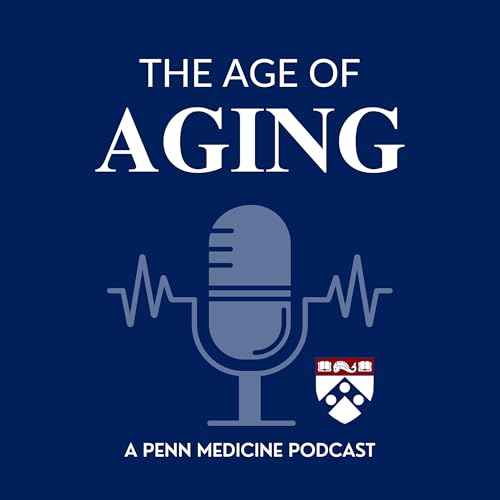At the Penn Memory Center, we often recommend exercise, social engagement, and a solid support system to help people age well. Owning a dog is not on that list, but maybe it should be. For many older adults, dogs are more than companions. They’re motivators to stay active, reasons to connect with neighbors, and steady sources of comfort through life’s challenges. Emerging research suggests that that this age-old bond between humans and dogs may be one of our healthiest friendships. On this episode of The Age of Aging, we celebrate dogs, and how they might help us live long, healthy lives.
First, we hear from caregivers and dog owners about how their dogs help them care for their loved ones with dementia. Then, Professor Philip Tedeschi explains how humans’ co-evolution with dogs has made us perfect support system for one another. Lynn Cronomiz recounts how a powerful moment between a therapy dog and her mother with Alzheimer’s helped her process her mother’s passing. Finally, we explore humans’ inseparable connection with nature through the biophilia hypothesis.
Resources available on the episode webpage linked below
- Dog ownership in the U.S. statistics – American Veterinary Medical Association
- “2025 Alzheimer’s Facts and Figures” – Alzheimer’s Association
- Listen to Season 1 Episode 4, “Diagnosing Dementia,” featuring Lynn Cronomiz
- Learn more about the Insitute for Human-Animal Connection
- Visit KPETS, which Lynn Cronomiz does her therapy dog work with
- Learn more about the “biophilia hypothesis”
- Petfinder to adopt a pet near you
- Visit the American Kennel Club website for more information on dog breeds
Special thanks to Tom Casey, Miguel Centeno, Kathy Oldfield, Philip Tedeschi LCSW, MSSW, Lynn Cronomiz, and Carlo Siracusa DVM, PhD, DACVB, DECAWBM
The Age of Aging is a Penn Memory Center production hosted by Editorial Director Terrence Casey and Producer Jake Johnson, in partnership with the Penn FTD Center, the Penn Institute on Aging, and Penn’s Alzheimer’s Disease Research Center. Contributors include Nicolette Calcavecchia, Dalia Elsaid, Jason Karlawish, Emily Largent, and Meaghan Sharp.
The Age of Aging is made possible by generous support from the Michael Naidoff Communications Hub fund and our sponsor, the TIAA Institute. The TIAA Institute is a think tank committed to building knowledge that advances lifelong financial security and well-being while considering the intersections of health and wealth. Their cutting-edge research provides actionable financial and longevity insig...
 Sep 30 202531 m
Sep 30 202531 m Sep 16 202533 m
Sep 16 202533 m 33 m
33 m Jul 22 202541 m
Jul 22 202541 m Jul 8 202540 m
Jul 8 202540 m Jun 24 202536 m
Jun 24 202536 m Jun 10 202540 m
Jun 10 202540 m May 27 202549 m
May 27 202549 m

